
Renting camera equipment can be a great option for photographers, whether they're professionals or hobbyists. However, it also comes with certain risks, such as damage, loss, or theft of the equipment, which could result in significant costs. To mitigate these risks, it is important to consider insurance options when renting camera lenses. Some rental companies, like Lensrentals, offer their own insurance plans, while others may require renters to obtain external insurance. Homeowners or renters insurance policies may provide some coverage for rented camera equipment, but it is important to carefully review the terms and conditions to understand the extent of the coverage. Additionally, specialised camera equipment rental insurance providers, like InsureMyEquipment, offer tailored policies to protect against various causes of damage or loss, giving photographers peace of mind during their rentals.
| Characteristics | Values |
|---|---|
| Rental company | Lensrentals, Adorama, BorrowLenses, InsureMyEquipment |
| Insurance company | State Farm, Allstate, Lemonade, InsureMyRentals, Tom Pickard Insurance Brokers, Full Frame Insurance |
| Insurance type | Homeowners insurance, renters insurance, inland marine insurance, business insurance, camera equipment rental insurance, Extra Coverage, professional liability insurance, general liability insurance |
| Coverage | Theft, loss, accidental damage, fire, vandalism, water damage, lightning damage, power surges |
| Cost | Depends on the equipment, its value, and the type of coverage |
What You'll Learn

How to insure rented camera lenses for loss or theft
If you're renting camera lenses, it's important to consider insurance to cover loss or theft. Here's a guide on how to do this:
Firstly, it's worth noting that some rental companies offer their own insurance plans, so this is worth looking into. For example, LensRentals.com offers the Lenscap Protection Plan and Lenscap+ Protection Plan, which cover damage, loss, and theft.
If you're looking for a third-party insurance provider, there are several options. InsureMyEquipment.com offers rental insurance for photographers, which covers loss, theft, and damage. This is tailored for rented gear and can be set up for the duration of your rental period.
Another option is to check your existing insurance policies. Your homeowners or renters insurance may cover rented camera equipment, but it's important to check the terms carefully. Some policies may only cover certain risks, such as fire or vandalism, and may not include accidental damage or theft. You may also need to add extra coverage specifically for your rented lenses.
If you're a professional photographer, your base homeowners or renters insurance will cover your rented equipment to a certain extent, but you won't be eligible for extra coverage. In this case, you may want to consider a business owner's policy, which provides more comprehensive coverage for your equipment.
When choosing an insurance provider, it's important to consider your specific needs. Check that the policy covers the risks you're most concerned about, such as accidental damage, theft, or loss. Also, make sure the policy covers the full value of the equipment you're renting.
Finally, it's worth noting that some rental companies, such as BorrowLenses.com (now part of LensRentals.com), offer insured rentals. This can be a convenient option, as you don't need to worry about organising separate insurance.
The Intriguing Pricing of Camera Lenses: Factors and Features
You may want to see also

What to do if your rented camera lens is damaged
If you've damaged a camera lens that you've rented, the first thing to do is to contact the rental company immediately. Most companies will require you to inform them of any damage as soon as possible, and failure to do so may result in additional fees or penalties.
Check the terms and conditions of your rental agreement to understand your responsibilities and liabilities in the event of damage. You may be required to replace the lens or pay for repairs, and if the lens is beyond repair, you may be charged the replacement cost. Some companies may offer protection plans or insurance that can help cover the costs of damage, so it's important to review your rental agreement carefully before finalising the rental.
Damage to a rented lens can include major scratches or scuff marks on the glass, as well as impact damage to the body or mechanical components. Normal wear and tear is typically not considered damage, but it's important to carefully review the rental company's definition of damage to understand what is and isn't covered.
If you haven't already returned the lens, be sure to include details of the damage when you inform the rental company. They may request that you return the damaged lens to them, and they may also provide instructions for the repair process. It's important to follow their instructions carefully to avoid any additional fees or misunderstandings.
In some cases, the rental company may choose to repair the lens in-house, in which case you'll be responsible for their reasonable expenses for parts and labour. Alternatively, they may choose an external repair facility, and you'll be responsible for the total cost of the repair if it's commercially reasonable.
It's worth noting that some rental companies may offer protection plans or insurance that can reduce your financial liability in the event of damage. These plans typically come with certain exclusions and limitations, so be sure to review the specific terms and conditions before purchasing any additional coverage.
Camera Lenses: Tangible Personal Property or Not?
You may want to see also

How to insure rented camera lenses for international travel
When travelling internationally, it's important to ensure that your rented camera lenses are insured. Here are some steps and considerations to help you insure your rented camera equipment:
- Check your existing insurance policies: Before purchasing new insurance, review your current policies, such as homeowners or renters insurance, to see if they provide any coverage for rented equipment. Keep in mind that there may be limitations on the amount of photography equipment covered under these policies, and it's always a good idea to consult with your insurance agent to clarify the extent of your coverage.
- Understand the risks involved: When renting camera lenses, you are responsible for their care during the rental period. Damage, loss, or theft of the equipment can result in significant costs. Therefore, it's crucial to assess the risks and determine if purchasing additional insurance is necessary.
- Explore specialised rental insurance options: Several companies offer camera equipment rental insurance, such as InsureMyEquipment.com. These policies are tailored for rented cameras and accessories, protecting against various causes of damage, loss, or theft. The duration of these policies can also be customised to fit your specific needs, whether it's for a short trip or a long-term project.
- Consider international travel coverage: If you're travelling internationally with rented camera gear, ensure that your chosen insurance policy includes worldwide coverage. Some policies may exclude certain countries or regions, so it's important to carefully review the terms and conditions before purchasing.
- Compare costs and customisation options: The cost of camera gear rental insurance can vary depending on several factors, but it tends to be quite affordable due to the customisation options available. Compare quotes from different insurance providers and consider the specific equipment you're renting to find the most suitable coverage at a reasonable price.
- Review the rental agreement: When renting camera lenses, carefully read and understand the rental agreement provided by the lens rental company. This agreement will outline your responsibilities as the renter and may include information about optional insurance plans or recommendations for obtaining external insurance.
By following these steps, you can ensure that your rented camera lenses are adequately insured for your international travels, giving you peace of mind and protection against unforeseen circumstances.
Choosing Camera Lenses: A Guide to Perfect Photography
You may want to see also

How to insure rented camera lenses for a short period
When renting camera equipment, you take on responsibility for the gear during the rental period, so it's a good idea to get insurance to cover any damage, loss or theft of the equipment.
Check your existing insurance policies
Start by reviewing your current insurance policies, such as your homeowners or renters insurance. Contact your insurance agent to see if your policy covers loss or damage to rented camera equipment. Some policies may provide limited coverage, but it's important to understand the extent of that coverage and any exceptions.
Consider rental company insurance plans
Many rental companies, such as LensRentals.com, offer their own insurance plans. These plans typically cover damage, loss, or theft of the equipment during the rental period. Carefully review the terms and conditions of these plans, as they may vary and may not cover all types of damage or loss.
Explore specialty insurance providers
If your existing insurance doesn't provide sufficient coverage, consider purchasing a policy from a specialty insurer. There are companies that specifically offer camera equipment rental insurance, such as InsureMyEquipment.com and InsureMyRentals.com. These policies can be tailored to short rental periods and can cover a wide range of gear.
Compare costs and coverage
When choosing an insurance option, consider the cost of the policy and the extent of the coverage. Rental insurance costs are based on various factors, and you can often customise the coverage to fit your needs. Be sure to read the fine print to understand what risks are covered, as some policies may exclude certain types of damage or international travel.
Adjust your policy duration
Whether you're renting equipment for a specific event, a short-term project, or a trip, you can usually adjust the duration of your insurance policy accordingly. Camera gear rental policies are typically flexible and can be set for short periods of a few days or extended up to a full year.
By following these steps, you can insure your rented camera lenses for a short period, giving you peace of mind and protection against potential financial losses.
Buffing Out Scratches: Restoring Camera Lenses to Perfection
You may want to see also

How much does it cost to insure rented camera lenses?
The cost of insuring rented camera lenses varies depending on the company and the level of coverage you require. Some companies offer insurance for rented camera equipment, which can cover damage, loss, or theft of the equipment. This type of insurance is often tailored to the specific needs of the renter, with policies lasting from a few days to a full year.
The cost of insurance can depend on several factors, including the value of the equipment, the duration of the rental, and the level of coverage chosen. Some companies offer insurance starting at around $500 per year, with higher rates for more comprehensive coverage. For example, Full Frame Insurance offers camera equipment insurance starting at $55 per year for up to $1,000 in coverage per item, with a $5,000 aggregate limit. Their highest amount of coverage is $15,000 per item with a $75,000 aggregate limit for $349 per year.
Additionally, some rental companies may offer their own insurance plans or suggest third-party insurers. For instance, LensRentals.com offers the Lenscap Protection Plan, which limits the renter's liability for damaged equipment to 10% of the replacement cost or the actual cost of repair, whichever is lower. There is also the Lenscap+ Protection Plan, which covers damage or loss of equipment and costs an additional sum.
It is important to carefully review the terms and conditions of any insurance policy before purchasing, as coverage may vary. Some policies may not cover certain types of damage or theft from an unlocked vehicle. International travel insurance may also be excluded or limited in certain regions.
RF and EF Camera Lens Compatibility: What You Need to Know
You may want to see also
Frequently asked questions
Some companies that offer camera equipment rental insurance include InsureMyEquipment.com, Lensrentals.com, and InsureMyRentals.
When choosing a camera equipment rental insurance provider, it is important to consider factors such as the cost of coverage, the duration of the policy, the range of equipment covered, and the risks protected against. It is also essential to read the terms and conditions carefully to understand what is covered and what is not.
Some alternatives to camera equipment rental insurance include using your homeowner's or renter's insurance policy, purchasing additional coverage specifically for camera equipment, or joining a professional photography association that offers insurance as a member benefit.







